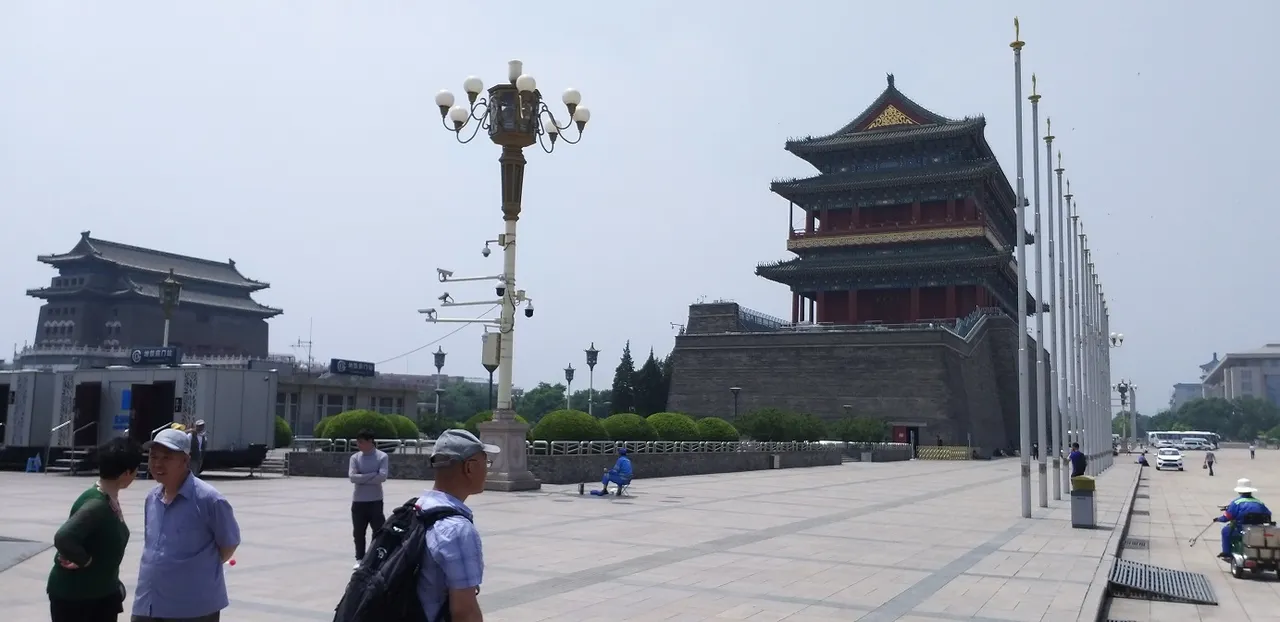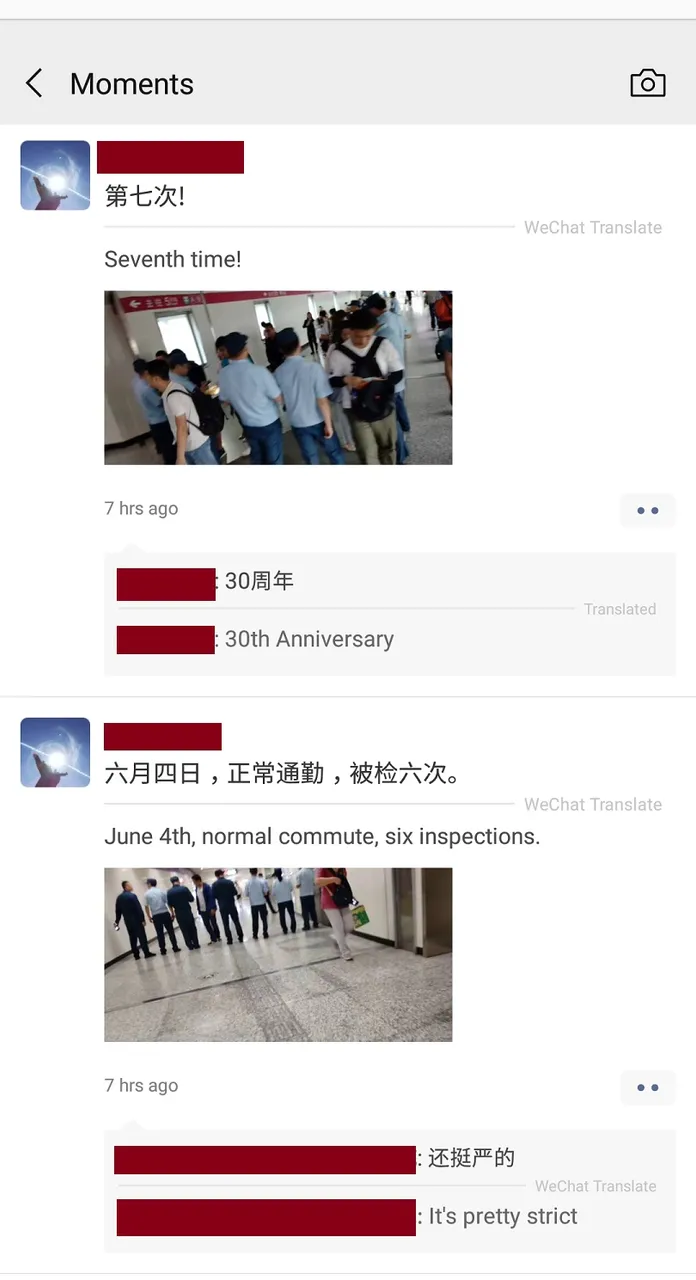
"The silver lining, if there is one, is that this June, when the 30 year anniversary of Tiananmen Square rolls around, if anything happens I'll be in Beijing to report it first-hand."
Those were my words when the reality set in a few months ago that I was, in fact, going to be stuck in China for several months. Looking back now, I'm not sure if I was worried about being in Beijing for such an inauspicious anniversary, excited about the possibility of being able to witness (and record) a potentially major event, or groaning in despair that I was going to have to deal with the everyday cesspool of stupidity that Chinese life entails for all the long months between then and now. However, as the day drew nearer, whatever I was feeling before turned into a ramped-up dose of the state-of-mind that has become my default mindset in China: exasperation.
In the days leading up to the anniversary of the 30 year anniversary of the Tiananmen Square massacre, Beijing's response was not by any standard unpredictable. Of course, anticipating criticism from the US to mark the occasion, they took the chance to fire some desperate "whataboutism" to deflect attention away from China and onto the US by issuing a travel warning to Chinese citizens thinking about travelling to the US (Cheng).
“Recently, U.S. law enforcement agencies have on multiple occasions used methods such as entry and exit checks, and on-site interviews to harass Chinese citizens in the U.S.,” the ministry said, according to CCTV.
Oh, wow. You mean US authorities are starting to treat Chinese citizens in the US the same way the PSB treats those of us Americans in China?! It's a scandal, I tell you! Next thing you know they'll be requiring Chinese citizens in America to register with the police, like sex-offenders, every time they go anywhere.
You know, EXACTLY THE WAY ALL FOREIGNERS ALREADY HAVE TO DO IN CHINA!
But frankly, that was of very little importance. If anything, the absence of Chinese tourist monsters will be a boon for the US, and we should all thank the Chinese government for preventing their neanderthalic populace from coming to the US to wreak their characteristic havoc. Of greater importance was what the Chinese government did right at home in Beijing to mark the occasion, and the answer is what has, indeed, become Beijing's standard response to anything, be it a major summit held in Beijing, or a series of uprisings in other totalitarian countries (Mosher, 134-138 & 223): they put the city in a siege-like state of lockdown.
The first casualty was internet access. China's normal internet censorship is done using firewalls that a user can get around using a Virtual Proxy Network (VPN). The Chinese Ministry of State Security's cybersecurity division has the means to block the internet so thoroughly that even VPN's won't work, but this is costly and energy inefficient enough that it is only done for short spans of time during "politically sensitive" moments. From midnight on June 2 until noon on the day of this writing was a "sensitive" enough period that any website that was not owned by the Chinese Party-State was blocked from any China-based server, even with a VPN.
The second was transportation. Subway stations that connect two lines of Beijing's metro system had temporary barriers set-up that forced all foot traffic into narrow lanes, slowing the pace of anyone attempting to navigate the stations to a crawl. The number of passengers was no higher than usual, yet the crowds were bottlenecked everywhere. Woe be unto anyone who had to make multiple transfers on their way to work. In fact, a Chinese colleague of mine posted on WeChat a photo complaining about the number of times he had to go through a police ID checkpoint just navigating the subway from home to work.

So then, Beijing's government was in crisis-management mode, expecting a wave of unrest across the city as the already-present simmering dissatisfaction brewing across China (Chu, 88 & 89; Fenby, 51, 52, 56 - 58, 118; McMahon, 76, 83, 155, 197 & 201; Xi, 17, 18, 124, 399 - 421) coincided with the bitter anniversary, resulting in unrest in the capital. Since it was unrest in the capital that led to the original Tiananmen protest (Four Corners), Beijing had good reason to fear this date, especially in light of the ongoing Cold War with the US. China has always been paranoid about foreign interference (they even claim to this day that the 1989 Tiananmen protest was caused by the CIA (Fenby, 57; Mosher, 223)), so it was only natural they should fear a second round when the thirty year anniversary of that same protest comes amid rising tensions with the US.
But never mind the hype.
What actually happened in Beijing on the 30 year anniversary of the Tiananmen Massacre?
...Not much.
Sure, there was the above-mentioned security, but the actual square itself was eerily calm, as you can see from the photo at the beginning of this article. I visited the square in person that day, taking Subway Line 2 to Qianmen Station to avoid the foot traffic at the two Line 1 Stations flanking the square, and when I arrived I was stunned. For perspective, even on a normal day, this square is a massive tourist draw, and is typically swamped with churning masses of people. On June 4, 2019, it was practically deserted. Of course, the fact that the People's Armed Police (a division of the PLA charged with putting down internal rebellions) had set up temporary security checkpoints at every entrance and were checking ID's and maintaining a maximum occupancy in the square of about 400 people, may have had something to do with that.
Oh, and they were banning any non-Chinese from entering a well. Because, you know, that's not blatantly racially discriminatory or anything, right?
It seems that despite Beijing's paranoia about this inauspicious anniversary, the Chinese Populace were not interested in rising up. What makes that surprising is that they all know about the massacre 30 years ago.
Contrary to what is generally believed in the West, most Chinese DO know at least part of the story of the Tiananmen Square Massacre. For example, look at the photo above, where my Chinese co-worker quite openly and casually refers to the "30th anniversary." Perhaps it is because recent experience, such as the government's cruelty toward those who sought redress after the 2008 Wenchuan Quake, has broken their spirit and taught them that the tyrants of Zhongnanhai do not have any Humanity in them, leaving the public afraid to rise.
Or, the fact may simply be that no one in China cares to mark the occasion simply because the massacre of thousands of Chinese by the Chinese government doesn't stand out in their minds. This seems likely, given that every Chinese leader from Qin Shihuang to Mao Zedong has regularly and casually slaughtered their own people.
Or, it may simply be that everyone is so busy trying to make ends meet as China's economy crashes and burns that they don't have time to take off from work for some whimsical ideological endeavor like a protest march.
Frankly, from what I've seen in my five years in Beijing, I'm leaning toward option 3.
Works Cited
Chu, Ben. Chinese Whispers. London, 2013. Weidenfeld & Nicolson.
ISBN 978-1-7802-2474-9
Cheng, Evelyn. "China Warns Citizens Against Travel to the US." CNBC. 4 June, 2019. Web, 7 June, 2019.
https://www.cnbc.com/2019/06/04/china-warns-citizens-against-travel-to-the-us.html
Fenby, Jonathan. Will China Dominate the 21st Century? Cambridge, 2017. Polity Publishing.
ISBN 978-1-5095-1097-9
Four Corners. "Tremble and Obey | Tiananmen Massacre." Facebook, 24 June, 2019, 9:14 AM. https://www.facebook.com/abc4corners/videos/320134092252726/?v=320134092252726 . Web, 7 June, 2019.
McMahon, Dinny. China's Great Wall of Debt. London, 2018. Little, Brown Book Group
ISBN 978-1-4087-1035-7
Mosher, Stephen W. Bully of Asia. Washington, 2017. Regnery Publishing.
ISBN 978-1-62157-696-9
Xi Jinping. The Governance of China, Vol. 1. Beijing, 2014. Foreign Languages Press.
ISBN 978-7-119-11394-4
